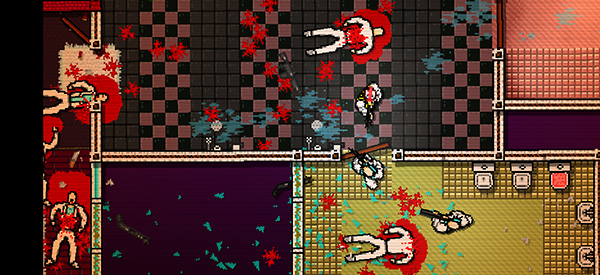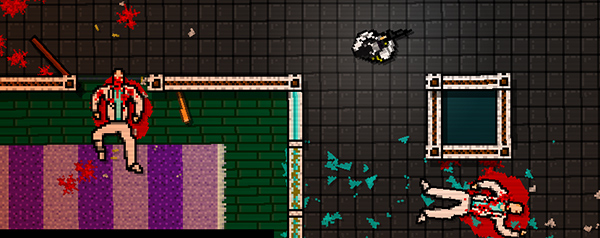Magnificent And Important Advent Calendar: Day 22
Like The Batphone
Twenty-two is a number that is important for all sorts of reasons, but perhaps the most important is that it is the neighbour of the eerie and secretive 23. Twenty-two is our only good way of keeping an eye on what twenty-three is up to, and it's often on the phone, reporting his activities. That weird bastard... I bet he has a gimp locked in the basement.
Anyway.
It's... Hotline Miami!
Alec:
We've talked a lot about Hotline Miami's death-lathe-like man-killing fluidity and the evil rhythm of its soundtrack, but those are perhaps only the more surface parts of its remarkable puzzle. It's easy to sum up HLM as a dark stoner fantasy - I know I have, albeit with tongue somewhat in cheek - but really it's an uncommonly meticulous game. Everything, it seems, is in there for a reason. The map and enemy layout of each of level, despite superficial similarities at least in the earlier stages, regularly demands new and challenging twists on the game's darting strategy purely by how cleverly and cruelly it places doors, walls, windows, dogs and weapons.
How do you cope with two guys with machine guns waiting behind a plate glass window that you have to run past? How do you deal with a setup which means six guys will probably rush you as soon as you step into the first hallway? And Jesus, what about that mid-game boss fight? It's hideous. It's supposed to be hideous.
For all its glibness, Drive-aping, neon-drenched excess and adrenalised brutality, Hotline Miami is created with watchmaker-precision. Each level is a devious new puzzle, artfully and sadistically escalated from the one before - slight twists to layouts and placements leading to brand new challenge. In addition to making relatively simple 2D art and featureless characters consistently create distinctively different and evocative environments, of course.
The same is true, I think, of the destabilising cutscenes and storytelling. It's not so much that there's a coherent tale to be unravelled by those willing to put the parts together in the right order, but that the scenes of our blood-soaked hero conversing with animal-headed aspects of his own psyche seem to be carefully placed to undermine triumphant feelings.
Just when you're feeling at your most superheroic, like you've mastered the killing flow and with that self-satisfaction put to bed those nagging doubts that maybe you're just a murderous thug, the music will turn into fever-dream Hellraiser, the light will dim and fracture, and a malevolent spirit with a horse's face will turn up to cryptically belittle you. The toll this take on confidence and sureness can be a heavy one, and that too helps escalate the challenge of the subsequent level.
Whatever we want to think of the game's concept, especially in the context of what dominates the news at the moment, the other thing to know and to unquestionably celebrate about Hotline Miami is that this is truly a master at work. Clear, focused, meticulous vision creating such a finely-tuned engine. Everything there for a reason, and all those reasons have an effect on how the game plays - and how it makes its alternately cocky and alarmed player feel. Similarly, HLM's controls and stripped down to bare essentials for a reason, so that the very most can be wrung from movement, planning and reaction, to that there is always certainty in what will happen so long as the player's strategy was a sensible one.
It's a brilliant, important piece of game design as well as being crowd-pleasing day-glo odyssey of gratuitousness, and gleaming proof of what absolute purpose can achieve even with minimal tools (in this case Gamemaker). Were I voting alone, this sinister masterpiece would be the game behind the 24th window of our calendar.
John: I don't get it. And that makes me sad. Very glad that people are are loving it so much, though.
Adam:
I was thirteen when I saw the screenshot below, or one very much like it, in a magazine. I think it was Amiga Power, although who trusts memories almost two decades old?
The game is Dreamweb and it’s notable for two reasons:
1) It’s the first game I ever saw a bare naked willy in.
2) Since I saw that screenshot all those years ago, I’ve been waiting for Hotline Miami to exist.
Dreamweb’s screenshots promised a different perspective on violence – a top-down, situational view that told its story of struggle and slaughter by means of bloody trails and crumpled bodies. The top-down view is so well-suited to the aftermath.
In Hotline Miami, the gap between the action and the aftermath is minute, measured in the emptying of a chamber or the crunching descent of a baseball bat. It’s one of the most rhythmic games I’ve ever played and causes the same muscle memory twitches as Super Hexagon. TICK TICK BOOM RESTART CRUNCH SPLATTER CLICK DEAD AGAIN. I haven’t played enough of Terry Cavanagh’s latest to know if I’ll ever improve at unpicking its death-wall lock-tumbling angry-shapes, but the music, the hypnotic pace and the incorporation of instantaneous restarts place it somewhere in the vicinity of Hotline Miami in my mind.
How important is the soundtrack? Hugely. The best way to talk about the music is like this.
What I always come back to when I think about those few neon hours just before dawn when I clobbered and clattered my way through the game is the fact that death ceased to matter. My finger hit the key to restart before I’d even processed my character’s extinction and I was back, and so was everybody else. Some of them carried different weapons and maybe a different one would land the inconsequential killer blow and then, quicker than thought, we’d be dancing again.
Hotline Miami is very good at aftermath – the crawling wounded, the finishing blow, the corpse slumping against a wall – but I resurrected almost as many men as I killed. Only to kill them again, sure, but I was dying a hell of a lot too and I felt fine afterwards. Maybe a bit miffed on occasion but fundamentally and soundly A-OK. Healthy, happy and none the worse for the thousand red flowers that had bloomed from my pixel-form.
In the sickened pop culture stew of Hotline Miami, I don’t reload guns, I reload lives, with the twitch of a finger and the slightest impact on a key. Whole again, ready again, impossible to extinguish. It’s not about death, it’s about the split seconds before it and how to make them last a lifetime.
Which is about forty seven seconds.







